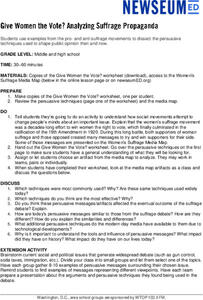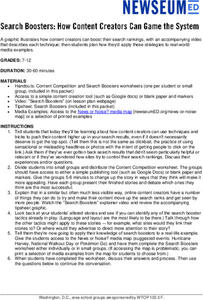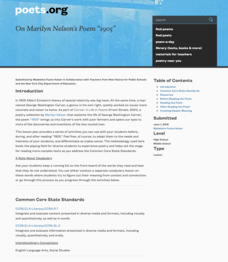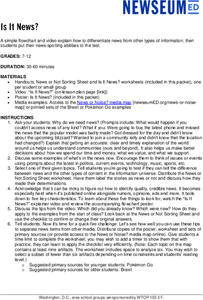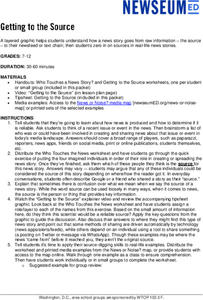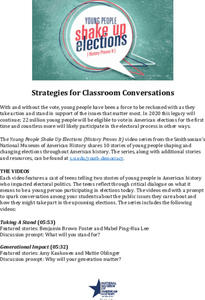Anti-Defamation League
Is Olympic Coverage Sexist?
Women Olympians have come a long way since 1900 when 22 women competed for the first time. News coverage of the Olympics has also changed dramatically. What has been slow to change, however, is the language used in the coverage of female...
Learning for Justice
Maya Angelou
Maya Angelou's poem, "Still I Rise", offers young scholars an opportunity to consider how poets use literary devices to create powerful messages. After a close reading and discussion of the poem, class members reflect on how they can...
Anti-Defamation League
The Gender Wage Gap
"Equal pay for equal work!" may sound logical but it is not the reality. High schoolers begin a study of the gender wage gap with an activity that asks them to position themselves along a line that indicates whether they strongly agree...
Anti-Defamation League
Who is Malala Yousafzai?
Malala Yousafzai may be young, but she's mighty! Young scholars listen to a short lecture about Malala's background, read an article about her winning the Novel Peace Prize, and meet in groups to discuss statements she has made. Class...
Newseum
Give Women the Vote? Analyzing Suffrage Propaganda
Propaganda is often used to shape public opinion. Scholars investigate the persuasive techniques used by the pro- and anti-suffrage movements. Groups compare how these devices were used during the suffrage movement with how the same...
Newseum
Search Boosters: How Content Creators Can Game the System
Scholars examine the techniques content creators use to boost their search rankings. After watching a short "Search Boosters" video, groups select a story from the "News or Noise? Media Map" and analyze the devices used in the story. The...
Academy of American Poets
On Marilyn Nelson's Poem “1905”
Marilyn Nelson's poem, "1905," asks young scholars to compare and contrast George Washington Carver and Albert Einstein. After studying images of the two scientists and listing their observations, class members listen to several readings...
Newseum
The First Amendment in Action Today
Young activists research a community issue and apply the rights defined in the First Amendment to develop a proposal that would solve the issue—using Pinterest's board "The Freedom to Make A Change Posters" as examples, groups design a...
Newseum
Confronting Conformation Bias
Be curious! Seek out different opinions! Be conscious of your thinking process! After reading an article about confirmation bias and motivated reasoning, class members apply these strategies to the topic of school start times. They read...
Newseum
Battle for the Bill of Rights: Ultimate Survivor Amendment Game
To understand the importance of the wording of the articles of the First Amendment (freedom of religion, freedom of speech and the press, and freedom to assembly and petition), teams argue before a jury for draft amendments of one...
Newseum
Propaganda Through History: Analyzing Historical Sources
Working in teams, pairs, or individually, scholars select one resource from a gallery of historical sources and consider which examples might be considered propaganda, the techniques used to persuade audiences, and evaluate how the...
Newseum
Search Signals: Understanding Your Top Hits
Class members watch a short video about the criteria used to drive search results to learn about how search engines work. Scholars use a "Search Signals" worksheet and a tip sheet to record information as they conduct a simple search of...
Newseum
'The Press and the Civil Rights Movement' Video Lesson
Scholars watch a video featuring journalists who covered the civil rights movement, then respond to questions on a viewing guide. The video features interviews with participants and original news footage from the 1950s and 1960s. In...
Newseum
Is It News?
Is it news or not? That is the question young journalists must consider in a lesson plan about newsworthiness. Class members watch a short video that details five key characteristics of quality, credible news. Individuals then use these...
Newseum
The Making of Fake News: A Case Study
"Fake News" (stories that are entirely fabricated/fictional) is the subject of a case study of the search for Jestin Coler, the creator of some of the most famous fake news stories. After reading NPR's investigative report, scholars...
Newseum
‘45 Words' Video Lesson
A short video introduces viewers to the political struggles involved in passing the First Amendment and the many challenges it has faced since its passage. Viewers then discuss how to balance issues of freedom of the press, national...
Newseum
Media Mix-Ups Through History: Analyzing Historical Sources
Scholars use the E.S.C.A.P.E. (Evidence Source, Context, Audience, Purpose, Execution) strategy to analyze a historical source to determine why mistakes happen in news stories. They then apply the same strategies to contemporary flawed...
Newseum
Getting to the Source
Reliable news stories are based on facts from reliable sources. Young journalists learn how to evaluate the reliability of news sources by watching a short explainer video. Teams apply their new source-digging skills to a current news...
Newseum
Weed Out Propaganda
Young scholars study four essential propaganda techniques: Simplification, Exploitation, Exaggeration, and Division (S.E.E.D.). Individuals select an example of propaganda from the past and present then compare how the key elements have...
California Department of Education
Learn to Reach Out
High school seniors use the CareerOneStop website to research professional associations related to careers that interest them. They then develop interview questions and arrange an informational interview with someone in the field.
California Department of Education
Roadmap to Success
It's never too early to start thinking of one's future. Over two class sessions, scholars create a roadmap to meet short and long-term goals related to high school graduation. Roadmaps include the timeline, checkpoints, and barriers.
California Department of Education
Etiquette? What’s That?
After watching a video, reading articles about etiquette in the workplace, and engaging in discussions, high school seniors create a presentation to show what they have learned about business etiquette.
California Department of Education
Who Am I?
Inspire scholars to strive for a career in a field they love. Using a game that looks at likes and dislikes, learners discover their Holland code using a three-interest area survey. With their targeted interests confirmed, pupils...
Smithsonian Institution
Young People Shake Up Elections (History Proves It) Educator Guide
Vote, it's your civic duty! The resource provides several videos about voting in the United States. Scholars watch a series of topics ranging from youth participation to civic action. The educator's guide provides teachers with...






